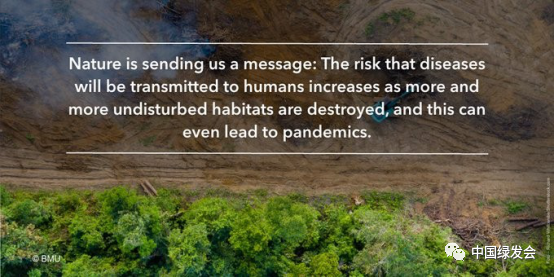John Scanlon德国环境部致辞:自然界正在提醒我们,生物多样性损失与野生动物贸易是大流行病的
编者按:
6月28日,非洲公园网络特使、大象保护计划特别顾问、联合国《濒危野生动植物种国际贸易公约》(CITES) 上一届秘书长约翰·斯坎伦 (John Scanlon) 先生在德国联邦环境部和自然保育及核能安全部会议上进行了特邀致辞。他与中国绿发会反盗猎工作组的小伙伴们分享了这则致辞。一如既往地,每次读他的论述,都让我们颇受启发。我们认为倾听国际前沿声音有利于推动中国深度参与#全球环境治理# ,有鉴于此,现将全文翻译分享于中国绿发会平台,供我国有关方面和专家们参考。


(供图:John Scanlon)
按/Linda 翻译/洪珮嘉 编/Angel

Wildlife trade
野生生物贸易
Wildlife crime
野生生物犯罪
We have known for some time now that serious wildlife crime is organised, transnational, is fuelled by corruption, and has a devastating impact on wildlife, local communities, national economies, security, public health and entire ecosystems, but this is now increasingly obvious.
我们已经了解,严重的野生生物犯罪往往是有组织的、跨国界的、受不正当利益驱动的,对野生动植物、当地社区、社会经济、国家安全、公共健康以及整个生态系统都有毁灭性的影响,且正变得越来越明显。
The figures are staggering. A recent report from the World Bank puts value of such crime in the vicinity of USD200 billion a year, when one includes all wildlife, including fish and timber. It says that governments are losing between USD7-12 billion a year in tax revenue, and the impact on ecosystems is valued in the order of USD1-2 trillion, as the theft of wildlife diminishes ecosystems, including their ability to mitigate climate change.[v] The costs of wildlife-related pandemics are incalculable.
相关数据十分触目惊心。世界银行近期的一份报告显示,野生动物犯罪行业每年的价值约有2千亿美元,包括所有野生动植物种类(比如鱼类和木材)。据报告,每年政府将在税收方面损失近70到120亿美元,野生动物犯罪对生态系统的影响将造成约1到2万亿美元的损失,因为盗猎野生动植物将对生态系统造成严重损失,比如丧失缓解气候变化的能力[5]。与野生动物相关的大流行病所造成的损失则无法预估。
Yet, remarkably, despite these facts, there is no global legal agreement on wildlife crime.
但令人匪夷所思的是,我们在野生动物犯罪方面却没有国际法律协定。
In the absence of any alternative, we have used CITES to crank up the fight against illegal wildlife trade, and with some success. However, CITES was never designed to deal with wildlife crime and its limitations as a trade-related, rather than a crime-related convention, in combating serious wildlife crimes are now in plain sight.[vi]
目前还没有可以代替《公约》的体系,我们利用《公约》框架加大对非法野生动物贸易的打击,已取得一定成果。但是,《公约》并不是为应对野生动植物犯罪而生,《公约》是一个围绕贸易,而不是犯罪的体系,在打击严重的野生动物贸易方面它的局限性显而易见[6]。
And with the benefit of the UN IPBES Global Assessment, we must look beyond CITES listed species, which accounts for only 36,000, or 0.5%, of the world’s eight million species, and use the law to help countries stop the theft of all their wildlife, plants and animals, terrestrial and marine, not just those species that are on the brink of extinction.
有了生物多样性和生态系统服务政府间科学-政策平台(IPBES)全球评估体系的帮助,我们不应只局限于《公约》附录名单里的物种。全球有大约800万种生物,然而CITES附录名单只涵盖了3.6万种,大约占0.5%。我们必须利用法律工具帮助各国终止所有盗取野生物种的行为,包括植物和野生动物(陆生和海洋),不应只关注濒临灭绝的物种。
We must finally grasp the nettle with wildlife crime and put combating serious wildlife crimes where it belongs. We must embed it into the international criminal law framework, which can be done via a new Protocol to the UN Convention against Transnational Organised Crime, as has been done for other serious crimes, such as human trafficking.
我们必须大刀阔斧地解决野生动物犯罪问题,给予其足够重视。我们必须将此纳入国际刑法框架内,效仿管控其他严重犯罪行为(比如人口贩卖)的措施,在联合国打击跨国有组织犯罪公约下签订新的议定书。
Protect wildlife at source
从源头上保护野生动物
Wherever possible, it is best to take measures to stop the illegal taking, trade and consumption of wildlife before it ever happens, by better protecting wildlife and its habitat.
只要有可能,我们应通过加大力度保护野生动物及其栖息地,在非法盗猎、交易和消费野生动物的行为发生前采取措施阻止它。
When they have a stake in it, local communities are the best protectors of wildlife, before it ever enters illegal trade, thereby helping avert the next wildlife-related pandemic.[vii]
当这些行为与当地居民的利益息息相关时,作为野生动物的最佳保护者,他们可以帮助阻止野生动物进入非法交易链。由此帮助预防下一场与野生动物有关的大流行病[7]。
We need to focus our collective efforts around large-scale, long-term commitments to biodiverse-rich places that are included in protected areasand other effective area-based conservation measures, and that can deliver multiple benefits.
我们应在涵盖范围广、长期有效的承诺下通力合作,重点关注受保护以及“其他有效的区域保护措施”(OECMs)管辖内的野生生物资源丰富的地区,以及关注可以带来切实成果的地区。
We need to both scale up our ambition for the area of land and sea included in such areas, as well as our investment in them, which has for too long been treated as a secondary issue. The next Conference of the Parties to the Convention on Biological Diversity, CoP15, presents an ideal opportunity to do so.
我们在保护和投资这类陆域和海域时需要放远目光,然而这类地区常常被放在次要议题的分类里。下一届《生物多样性公约》缔约方大会(CBD CoP15)提供了一个解决问题的绝佳机会。
When well-managed, these areas provide security for people and wildlife and bring about stability, creating the conditions needed to attract tourism, secure carbon, combat poaching, protect biodiversity, and create decent local jobs in remote areas. They deliver on multiple global commitments all through one investment window, which I’ve seen for myself across many countries, including in the Garamba National Park in the DRC.
只要管理恰当,这些地区能保证人们和野生动物的安全,带来稳定和法律秩序,并创造条件吸引游客、降低碳排放量、打击盗猎行为、保护生物多样性,以及在偏远地区创造体面的工作机会。只要通过一类投资窗口,就能实现多项全球承诺。我已经在许多国家见证过这些成果,比如在刚果民主共和国的戈朗巴国家公园(Garamba National Park)。
The proposed German Legacy Landscape Fund and the UK’s Biodiverse Landscape Fund both adopt this approach, which is most welcome, but the funding is limited.
在德国设立的风景遗产基金会和英国的生物多样性景观基金会都已采取此类措施,值得我们鼓励,但他们的运营资金十分有限。
Today we better understand the multiple benefits of nature conservation, yet these benefits are not sufficiently recognised by health, development or security initiatives or their financing. As the benefits of effective nature conservation extends well beyond wildlife, so too must the sources of financing.
今天我们更加深刻地理解到了自然保护的益处,但健康、发展或安全方面的倡议或资助并没有足够体现这种认识。既然有效的自然保护措施所带来的益处不仅限于野生生物,融资来源也不应局限于此。
If we manage to take these separate but interrelated actions[viii], I believe we will be well placed to avert the next wildlife-related pandemic, but if we do not act boldly now to institutionalise the changes that are needed to laws, funding and programmes, I fear we may find ourselves back in the same place in the not too distant future.
如果我们有办法采取这些行动[8],我相信我们将足以避免下一场与野生动物相关的大流行病。但是我们如果不采取大胆行动,将相关法律的修订、相关基金和项目制度化,我担心未来我们可能再次陷入与如今相同的境地。
Thank you for the invitation to address you.
十分感谢邀请我发言。
(注:本文代表作者本人观点)
【尾注】
[i] Such as HIV-AIDS, Ebola, MERS, SARS and more
[1]比如艾滋病、埃博拉病毒、中东呼吸综合征、非典等
[ii] CITES trade controls only address overexploitation, namely whether a trade transaction will threaten the survival of that species. CITES narrow focus on overexploitation was sound when the Convention was negotiated in the early 1970’s, but it cannot be sustained in a post COVID-19 world.
[2]《公约》的贸易监管工具只关注资源过度开发的问题,也就是说,某次交易是否会威胁该物种的生存。该单一关注点在20世纪70年代初期,也就是在制定《公约》的时期里显得十分合理,但这一关注点在“后新冠时代”将不再可行。
[iii] Including in listing species or in approving any trade transactions. For example, pangolins are listed under CITES, horseshoe bats, along with many other bat species, are not.
[3]比如在制定附录名单或批准交易时。例如,《公约》附录里列出了穿山甲,但菊头蝠和其它种类的蝙蝠却不在该公约附录名单内。
[iv] Which seeks to bring public, animal and plant health and the environment closer together
[4]“同一健康”的方针寻求将公共健康、动植物健康以及环境紧密联系在一起。
[v] Recent scientific reports show that intact ecosystems are better at sequestering carbon than degraded ones.
[5]近期有科学研究表明,完好无损的生态系统在吸收碳排放的能力比受损的生态系统更强。
[vi] This is perhaps best illustrated by the fact that record levels of illegal trade in pangolins have been recorded over the past two years, despite them being given the highest level of protection under the Convention in 2016.
[6]最明显体现的是过去两年内,穿山甲非法贸易破纪录式增长,而穿山甲恰巧是《公约》自2016年来保护力度最大的动物。
[vii] Wildlife-based tourism revenue is a critical part of the financing of nature conservation especially in developing countries. This current loss of revenue, and related jobs, is seriously challenging wildlife protection efforts, and could lead to an increase in poaching, degradation of ecosystems, and instability, thereby increasing the threat posed by high-risk wildlife trade, and exacerbating the effects of climate change. We must find a way to bridge this financing gap, which is addressed in your next session.
[7]以野生生物资源为主的旅游业收入是自然保护筹资的关键部分,特别是在发展中国家。目前这方面的收入减少和相关工作人员下岗,正严重挑战野生动植物保护工作,可能导致更多盗猎行为、生态系统退化加剧和不稳定性上升,从而增加高风险野生动物贸易带来的威胁,加剧气候变化现象。我们必须找到弥合这一资金缺口的方法,下届会议将解决这一问题。
[viii] It’s important to also note that to be as effective as possible, all these efforts will need to be complemented by well-targeted demand reduction campaigns, and, where necessary, initiatives to provide alternative sources of protein and livelihoods to people severely affected by any bans. Traditional, subsistence practices use should not be impacted.
[8] 值得注意的是,若想让这些措施卓有成效,所有措施都应通过定位精准的需求降低行动来实施,若条件允许,也可通过一些倡议,为受禁令严重影响的群体提供其他蛋白质和生计来源。传统的维持生计方法不应受影响。
专业会员

中国绿发会的最新文章:
- 周晋峰受邀参加2021全球绿色发展高峰论坛并作专题报告
- 国际类人猿专家与动物保护组织负责人联名致信中国生态环境部——挽救印尼达班努里猩猩
- 武汉东湖蓝藻爆发,管理方出动无人机喷洒药剂,管用不?| 志愿者反映
- 将贯穿会议全流程各方面!周晋峰建言CBD COP15组委会绿色节俭办会获积极采纳
- 保护生物多样性,有效监督违法 | 绿会“中华蜜蜂保护地▪桐柏山”霍岱珊主任2021保护地年会经验分享
- 周晋峰携绿会IUCN-WCC代表团深度参与第七届世界自然保护大会 | 传播中国声音 共建生态文明
- 履行生物多样性保护责任,企业应该怎么做? | 周晋峰访谈实录
- 开学进行时——向塑料书皮说no难不难? | 绿会减塑捡塑工作组线索征集
- 参访座谈 | 绿会副理事长到访北京城建设计发展集团
- CBD公约执秘致辞COP15预会,谈2020年后全球生物多样性框架目标
| 我也说两句 |
| 版权声明: 1.依据《服务条款》,本网页发布的原创作品,版权归发布者(即注册用户)所有;本网页发布的转载作品,由发布者按照互联网精神进行分享,遵守相关法律法规,无商业获利行为,无版权纠纷。 2.本网页是第三方信息存储空间,阿酷公司是网络服务提供者,服务对象为注册用户。该项服务免费,阿酷公司不向注册用户收取任何费用。 名称:阿酷(北京)科技发展有限公司 联系人:李女士,QQ468780427 网络地址:www.arkoo.com 3.本网页参与各方的所有行为,完全遵守《信息网络传播权保护条例》。如有侵权行为,请权利人通知阿酷公司,阿酷公司将根据本条例第二十二条规定删除侵权作品。 |
 m.quanpro.cn
m.quanpro.cn